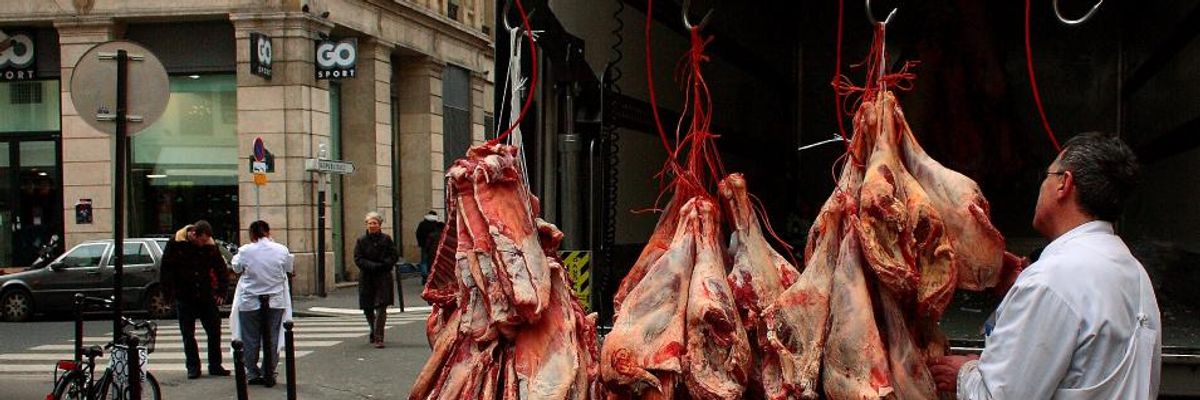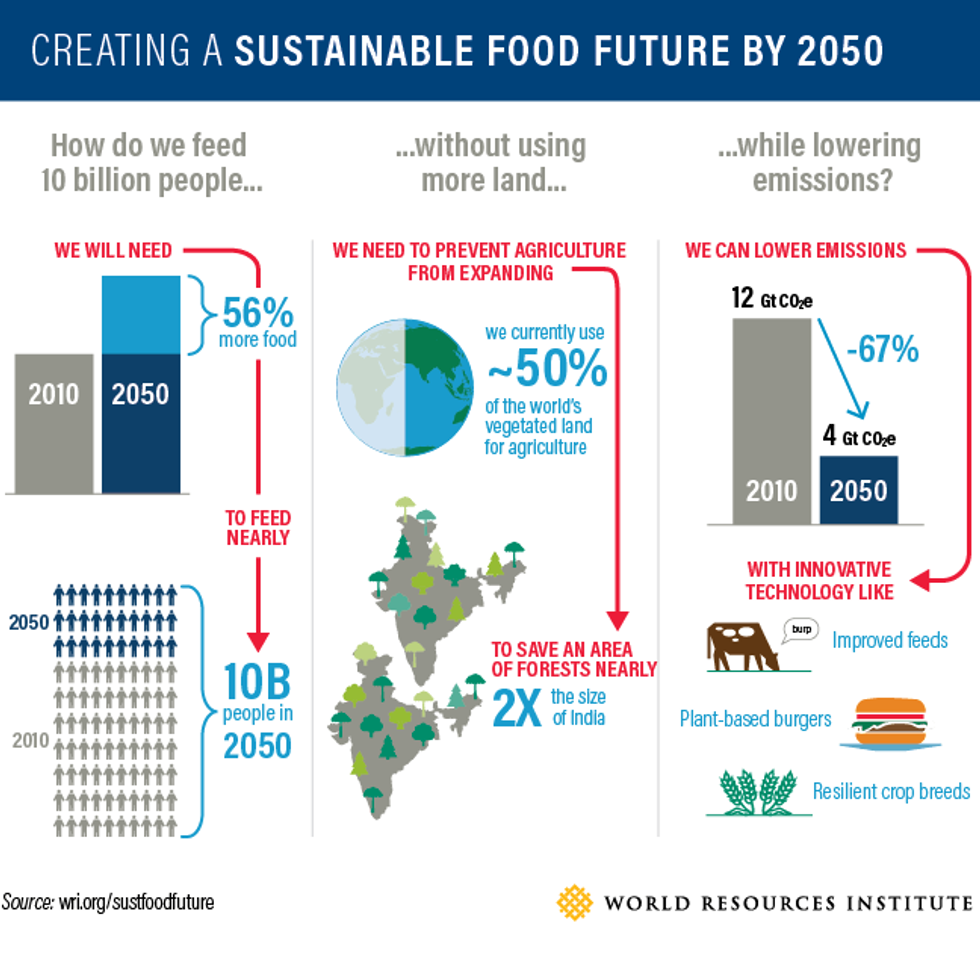
Limits on meat-eating are among 22 proposals to curb planet-warming emissions from a new report unveiled at COP24 in Poland on Wednesday. (Photo: Evan Bench/Flickr/cc)
Slash Meat Consumption and Avert Climate Catastrophe, Says New Blueprint for 'Sustainable Food Future' by 2050
The report features 22 proposals to feed the growing human population
To feed the growing human population--projected to reach about 10 billion by 2050--while curbing planet-warming emissions to ward off climate catastrophe, people across the globe must significantly cut back on eating meat from cows, sheep, and goats, according to a new study out Wednesday.
Limits on meat-eating are among 22 proposals from the report that, if simultaneously enacted, could achieve "meeting growing demands for food, avoiding deforestation, and reforesting or restoring abandoned and unproductive land--and in ways that help stabilize the climate, promote economic development, and reduce poverty."
Unveiled at COP24 in Katowice, Poland, Creating a Sustainable Food Future (pdf) was produced by WRI in partnership with the World Bank, U.N. Environment, U.N. Development Program, and a pair of French agricultural research agencies.

Attaining a "sustainable food future," the report says, will require closing three gaps:
- the food gap: the difference between the amount of food produced now and what will be needed by 2050;
- the land gap: the difference between agricultural land today and what will be required to produce enough food to feed the world's growing population; and
- the greenhouse gas mitigation gap: the difference in planet-warming emissions expected to result from land use in 2050 and worldwide goals to limit global warming to 2degC above pre-industrial temperatures.
Regardless of which solutions are pursued to close these gaps, the need for action is apparent.
As Tim Searchinger of the WRI and Princeton University put it, "If we tried to produce all the food needed in 2050 using today's production systems, the world would have to convert most of its remaining forest, and agriculture alone would produce almost twice the emissions allowable from all human activities."
While the report suggests that 2 billion people in countries that include Brazil, Russia, and the United States cut their beef and lamb consumption by 40 percent--a lower reduction than some other studies have recommended--Searchinger told the Guardian, "We think that is a realistic goal," especially considering that "in the U.S. and Europe, beef consumption has already reduced by one-third from the 1960s until today."
The 22 proposals outlined in the report are divided into a "five-course menu":
\u201cThere is no silver bullet to achieve a #sustfoodfuture - we need to adopt all items on a five-course menu of solutions to feed 10 billion people by 2050 without destroying the world. Learn more: https://t.co/8p6dOKIHon #COP24\u201d— World Resources Inst (@World Resources Inst) 1544011812
"We have to change how we produce and consume food, not just for environmental reasons, but because this is an existential issue for humans," concluded Janet Ranganathan, report co-author and WRI's vice president for science and research.
The synthesis report mirrors previous findings, including a study published by Nature in October which called for overhauling the world's current food system by shifting toward more plant-based diets, improving technologies and management, and slashing global food waste.
An Urgent Message From Our Co-Founder
Dear Common Dreams reader, The U.S. is on a fast track to authoritarianism like nothing I've ever seen. Meanwhile, corporate news outlets are utterly capitulating to Trump, twisting their coverage to avoid drawing his ire while lining up to stuff cash in his pockets. That's why I believe that Common Dreams is doing the best and most consequential reporting that we've ever done. Our small but mighty team is a progressive reporting powerhouse, covering the news every day that the corporate media never will. Our mission has always been simple: To inform. To inspire. And to ignite change for the common good. Now here's the key piece that I want all our readers to understand: None of this would be possible without your financial support. That's not just some fundraising cliche. It's the absolute and literal truth. We don't accept corporate advertising and never will. We don't have a paywall because we don't think people should be blocked from critical news based on their ability to pay. Everything we do is funded by the donations of readers like you. Will you donate now to help power the nonprofit, independent reporting of Common Dreams? Thank you for being a vital member of our community. Together, we can keep independent journalism alive when it’s needed most. - Craig Brown, Co-founder |
To feed the growing human population--projected to reach about 10 billion by 2050--while curbing planet-warming emissions to ward off climate catastrophe, people across the globe must significantly cut back on eating meat from cows, sheep, and goats, according to a new study out Wednesday.
Limits on meat-eating are among 22 proposals from the report that, if simultaneously enacted, could achieve "meeting growing demands for food, avoiding deforestation, and reforesting or restoring abandoned and unproductive land--and in ways that help stabilize the climate, promote economic development, and reduce poverty."
Unveiled at COP24 in Katowice, Poland, Creating a Sustainable Food Future (pdf) was produced by WRI in partnership with the World Bank, U.N. Environment, U.N. Development Program, and a pair of French agricultural research agencies.

Attaining a "sustainable food future," the report says, will require closing three gaps:
- the food gap: the difference between the amount of food produced now and what will be needed by 2050;
- the land gap: the difference between agricultural land today and what will be required to produce enough food to feed the world's growing population; and
- the greenhouse gas mitigation gap: the difference in planet-warming emissions expected to result from land use in 2050 and worldwide goals to limit global warming to 2degC above pre-industrial temperatures.
Regardless of which solutions are pursued to close these gaps, the need for action is apparent.
As Tim Searchinger of the WRI and Princeton University put it, "If we tried to produce all the food needed in 2050 using today's production systems, the world would have to convert most of its remaining forest, and agriculture alone would produce almost twice the emissions allowable from all human activities."
While the report suggests that 2 billion people in countries that include Brazil, Russia, and the United States cut their beef and lamb consumption by 40 percent--a lower reduction than some other studies have recommended--Searchinger told the Guardian, "We think that is a realistic goal," especially considering that "in the U.S. and Europe, beef consumption has already reduced by one-third from the 1960s until today."
The 22 proposals outlined in the report are divided into a "five-course menu":
\u201cThere is no silver bullet to achieve a #sustfoodfuture - we need to adopt all items on a five-course menu of solutions to feed 10 billion people by 2050 without destroying the world. Learn more: https://t.co/8p6dOKIHon #COP24\u201d— World Resources Inst (@World Resources Inst) 1544011812
"We have to change how we produce and consume food, not just for environmental reasons, but because this is an existential issue for humans," concluded Janet Ranganathan, report co-author and WRI's vice president for science and research.
The synthesis report mirrors previous findings, including a study published by Nature in October which called for overhauling the world's current food system by shifting toward more plant-based diets, improving technologies and management, and slashing global food waste.
To feed the growing human population--projected to reach about 10 billion by 2050--while curbing planet-warming emissions to ward off climate catastrophe, people across the globe must significantly cut back on eating meat from cows, sheep, and goats, according to a new study out Wednesday.
Limits on meat-eating are among 22 proposals from the report that, if simultaneously enacted, could achieve "meeting growing demands for food, avoiding deforestation, and reforesting or restoring abandoned and unproductive land--and in ways that help stabilize the climate, promote economic development, and reduce poverty."
Unveiled at COP24 in Katowice, Poland, Creating a Sustainable Food Future (pdf) was produced by WRI in partnership with the World Bank, U.N. Environment, U.N. Development Program, and a pair of French agricultural research agencies.

Attaining a "sustainable food future," the report says, will require closing three gaps:
- the food gap: the difference between the amount of food produced now and what will be needed by 2050;
- the land gap: the difference between agricultural land today and what will be required to produce enough food to feed the world's growing population; and
- the greenhouse gas mitigation gap: the difference in planet-warming emissions expected to result from land use in 2050 and worldwide goals to limit global warming to 2degC above pre-industrial temperatures.
Regardless of which solutions are pursued to close these gaps, the need for action is apparent.
As Tim Searchinger of the WRI and Princeton University put it, "If we tried to produce all the food needed in 2050 using today's production systems, the world would have to convert most of its remaining forest, and agriculture alone would produce almost twice the emissions allowable from all human activities."
While the report suggests that 2 billion people in countries that include Brazil, Russia, and the United States cut their beef and lamb consumption by 40 percent--a lower reduction than some other studies have recommended--Searchinger told the Guardian, "We think that is a realistic goal," especially considering that "in the U.S. and Europe, beef consumption has already reduced by one-third from the 1960s until today."
The 22 proposals outlined in the report are divided into a "five-course menu":
\u201cThere is no silver bullet to achieve a #sustfoodfuture - we need to adopt all items on a five-course menu of solutions to feed 10 billion people by 2050 without destroying the world. Learn more: https://t.co/8p6dOKIHon #COP24\u201d— World Resources Inst (@World Resources Inst) 1544011812
"We have to change how we produce and consume food, not just for environmental reasons, but because this is an existential issue for humans," concluded Janet Ranganathan, report co-author and WRI's vice president for science and research.
The synthesis report mirrors previous findings, including a study published by Nature in October which called for overhauling the world's current food system by shifting toward more plant-based diets, improving technologies and management, and slashing global food waste.

